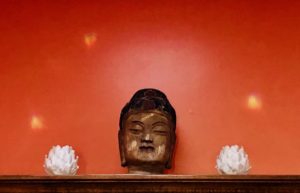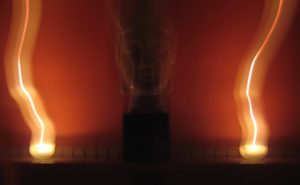
– Photo by Jan Ketchel
Carl Jung defined a psychological complex as a ‘feeling toned idea’ that acts quite autonomously in the human psyche. When Jung was performing his word association tests he observed that certain words triggered delayed reaction times and emotional reactions in his experimental subjects. Something ‘else’ was interfering.
This led to his discovery that there are autonomously functioning parts of the psyche acting outside of consciousness. Jung called these influences ‘complexes’. Freud spent his entire career highlighting the Oedipal complex, which he considered the greatest unconscious influence upon the human psyche.
Today we have terms like alters, ego states, fragmented parts or archetypes to depict these autonomous influences upon consciousness. Robert Monroe took Western psychology a step further with his research into out-of-body (OBE) states, where consciousness discovers non-material parts of the self that regularly influence consciousness from subtler planes of existence.
Monroe’s discoveries concur with Hindu science with respect to the emotional/desire body as the first to be encountered in an OBE state. Many OBE explorers report an encounter with excess sexual desire in their early explorations. Monroe also discovered a preponderance of sexual preoccupation by many travelers who had left human form through physical death, as they remained fixated on sexual activity, though lacking a physical body.
Monroe’s discovery certainly lays credence to Freud’s emphasis upon the overarching significance of sexuality for human beings. Sex may be the major karmic issue that sends disembodied spirits back into human life. Monroe also reported encounters on the astral plane with the energy body of sleeping human beings, equally preoccupied with sex in their dream states.
Beyond sex are the many emotional attachments that humans, in their energy body OBE states, are found to be preoccupied with. Civilization, with its emphasis upon reason, uniformity and conformity, has suppressed and repressed the spontaneous living of impulse. What we previously considered as repressed and contained within the psyche in the physical body may be very actively living on the astral plane outside of human consciousness.
The current polarized attitudinal split in the human race might actually reflect this polarized split within the human psyche, manifesting as an outer collective opposition. If we distill this opposition, it could be reduced to, simply, reason vs impulse. Resolution of this opposition is fundamental to unified progress.
Shamans introduced the practice of recapitulation as one’s individual soul retrieval journey. If one can bring consciousness and reconciliation to all of one’s parts, one can achieve wholeness while in human form. To the extent that this remains incomplete will determine one’s karma. After all, how can one go forward as a fragmented soul. One must first discover and gather together all of one’s parts.
Elmer Green served as his wife Alyce’s shamanic guide in her journey through Alzheimer’s disease. Alyce had spent her entire adult life immersed in the highest of spiritual principles. As her energy body journeyed into the astral plane, as she went the course of Alzheimer’s, she encountered her shadow self, the repressed and unloved side of herself, for the first time.
Besides her memory loss, she became paranoid and rageful much of the time. These experiences were largely driven by her encounters with her unknown self. With extreme patience, Elmer helped her to get grounded and reconcile with her fuller self. This enabled her to enter infinity at an advanced level, well beyond the shadow bardos, when she physically died in this world.
Jung’s choice of the word complex to denote autonomous parts of the psyche truly holds up. Humans are complex beings! The key challenge in human form is to resolve all of one’s complexes and become one’s true wholeness. With wholeness one’s energy is fully united, as everything becomes possible.
From complex to unity,
Chuck




